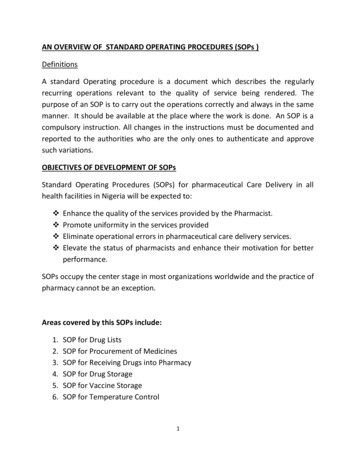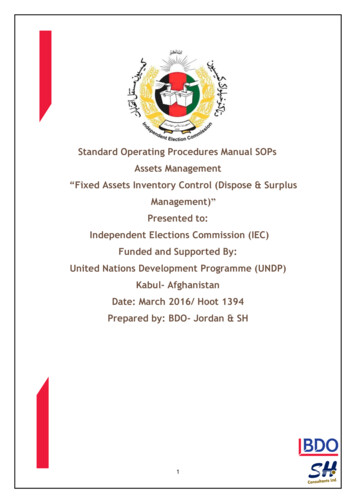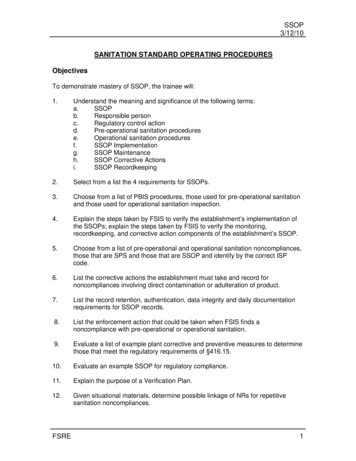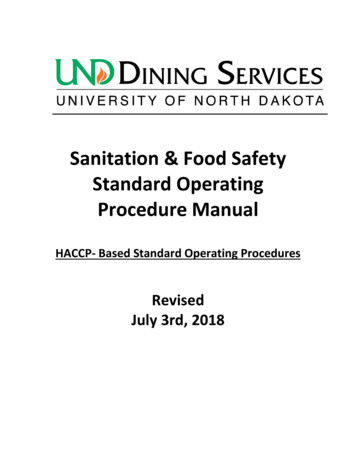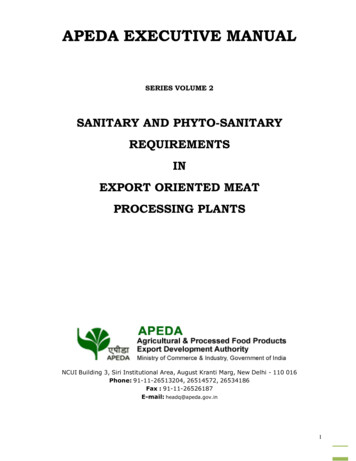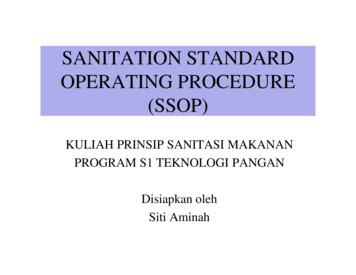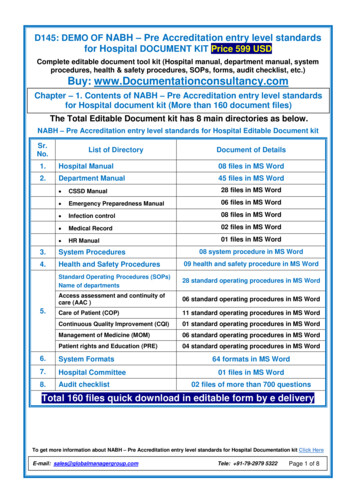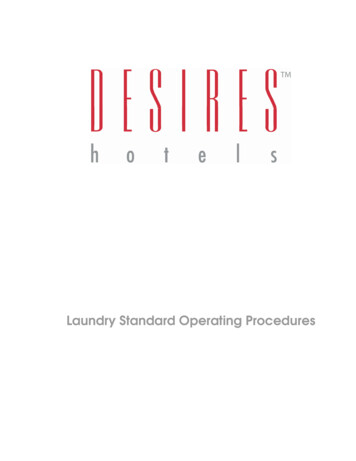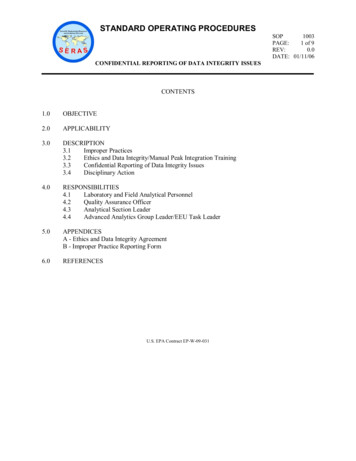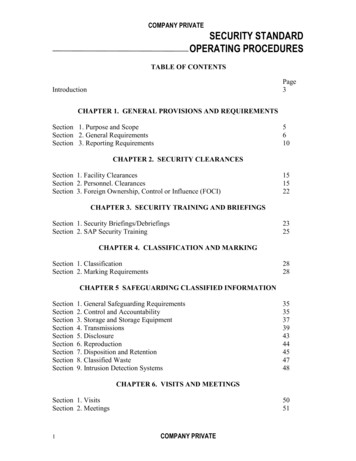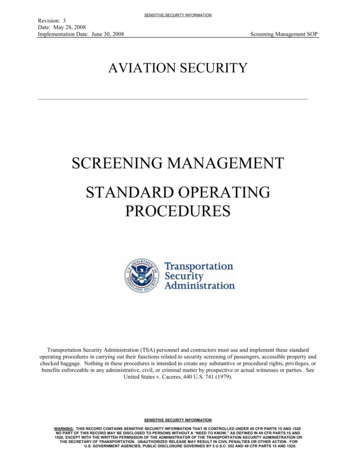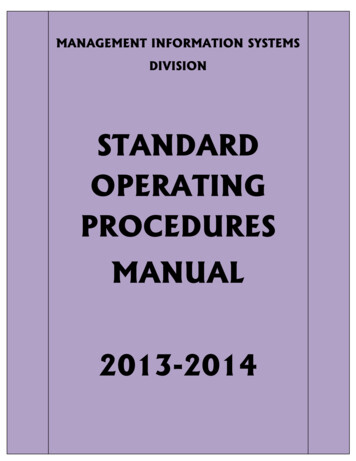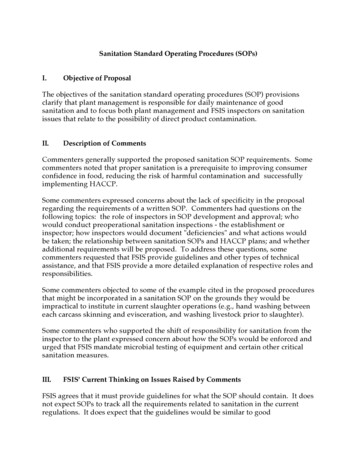
Transcription
Sanitation Standard Operating Procedures (SOPs)I.Objective of ProposalThe objectives of the sanitation standard operating procedures (SOP) provisionsclarify that plant management is responsible for daily maintenance of goodsanitation and to focus both plant management and FSIS inspectors on sanitationissues that relate to the possibility of direct product contamination.II.Description of CommentsCommenters generally supported the proposed sanitation SOP requirements. Somecommenters noted that proper sanitation is a prerequisite to improving consumerconfidence in food, reducing the risk of harmful contamination and successfullyimplementing HACCP.Some commenters expressed concerns about the lack of specificity in the proposalregarding the requirements of a written SOP. Commenters had questions on thefollowing topics: the role of inspectors in SOP development and approval; whowould conduct preoperational sanitation inspections - the establishment orinspector; how inspectors would document "deficiencies" and what actions wouldbe taken; the relationship between sanitation SOPs and HACCP plans; and whetheradditional requirements will be proposed. To address these questions, somecommenters requested that FSIS provide guidelines and other types of technicalassistance, and that FSIS provide a more detailed explanation of respective roles andresponsibilities.Some commenters objected to some of the example cited in the proposed proceduresthat might be incorporated in a sanitation SOP on the grounds they would beimpractical to institute in current slaughter operations (e.g., hand washing betweeneach carcass skinning and evisceration, and washing livestock prior to slaughter).Some commenters who supported the shift of responsibility for sanitation from theinspector to the plant expressed concern about how the SOPs would be enforced andurged that FSIS mandate microbial testing of equipment and certain other criticalsanitation measures.III.FSIS' Current Thinking on Issues Raised by CommentsFSIS agrees that it must provide guidelines for what the SOP should contain. It doesnot expect SOPs to track all the requirements related to sanitation in the currentregulations. It does expect that the guidelines would be similar to good
manufacturing practices (GMPs) in that they would reflect currently accepted goodsanitation procedures, and that they would focus on the daily sanitation tasks theplant must undertake to prevent the occurrence of insanitary conditions, both at thetime of start-up and during operation, that could result in direct productcontamination. FSIS does not intend to prescribe a format for the SOP or SOPrecords; however, it will provide guidelines, as noted above.Under the sanitation SOP system, the plant would make the decision to commencedaily operations, based on successful completion of its own sanitation inspectionand appropriate notation in its records, according to its SOP.Under the sanitation SOP system, the plant would make the decision to commencedaily operations, based on successful completion of its own sanitation inspectionand appropriate notation in its record, according to its SOP.FSIS considered, before it proposed SOPs, the alternative of dealing with sanitationthrough HACCP plans. The agency believes it may be appropriate, once a plantestablishes a HACCP plan, to monitor and verify some sanitation areas under thecritical control points (CCPs) included in a plant's HACCP plan. Those sanitationareas that are not appropriate to monitor under CCPs of a HACCP plan wouldcontinue to be monitored in the SOP. Thus, FSIS would expect SOPs to continue ona parallel basis with HACCP plans after HACCP implementation. However, FSISdoes not expect duplicate monitoring by the plant under both systems.Given that most sanitation areas would not be included in HACCP plans, FSIS hasnot identified, nor have the comments produced, any alternatives to the proposedSOPs that are as effective in clarifying industry/government responsibilities andthat permit the agency to improve the productivity of sanitation inspection so thatresources will be available to focus on CCPs.FSIS intends to focus its inspectional oversight and enforcement on whether a planthas a sanitation SOP that follows good manufacturing practices, is following the SOPon a daily basis, and is successfully preventing insanitary conditions that couldresult in product contamination.Failure to have a sanitation SOP, or to consistently follow it, or the presence ofinsanitary conditions that could result in product contamination, would requireimmediate regulatory action, including consideration of whether particular lots ofproduct have been rendered adulterated and should be retained or recalled. Theseconditions would be identified by the inspector and documented by the inspectorand, as necessary, by compliance personnel. In cases of observable productadulteration or the high probability of product adulteration, the inspector wouldstop operations in the plant. In other cases, the correct regulatory action would bedecided on a case-by-case basis. Repeated violations of SOP requirements or apersistent pattern of insanitary conditions would be the basis for withdrawinginspection.
Specific Economic Considerations and IssuesI.Objective of ProposalThe Pathogen Reduction/HACCP proposal acknowledged that the proposedrequirements would have significant economic impact, particularly on smallentities. Comments were requested on cost estimates for these impacts as well as onalternative regulatory approaches that could lessen this economic impact.II.Description of CommentsSeveral themes emerged from the written comments received and oral statementsmade during public meetings on the Pathogen Reduction/HACCP proposed rule. Aprimary concern was that the proposal would have several negative economicimpacts on small businesses. Some commenters opposed mandatory HACCP, dailymicrobial testing, and stringent time and temperature requirements.While most commenters supported HACCP in principle, small businesses expressedconcern about hazard analysis and plan development costs, equipment purchases,plant personnel training, and records maintenance. Suggested alternatives includedvoluntary HACCP, a 5-year implementation period, increased financial andtechnical support, alternative training options, inplant demonstration projects andgeneric HACCP plans.Daily microbial testing of carcasses from each species slaughtered and of each type ofraw ground product was cited as an unfair burden on small plants that slaughteronly a few animals, a variety of species, or produce several different raw groundproducts. Some commenters proposed a frequency of microbial testing based onproduction volume or simply once per week or month in small plants. It was alsosuggested that federally-subsidized laboratories conduct the testing, an indicatororganism instead of Salmonella be selected, and that either FSIS inspectors or, in thecase of State-inspected plants, State inspectors conduct the sampling.In response to the proposed carcass cooling time and temperature mandates, smallbusinesses voiced a need for more realistic standards that reflect small plant productvariety, processing operations, and shipping norms. Some said they would need topurchase additional refrigeration equipment for compliance with the proposedrequirements. Others cited the "command and control" nature of these proposedstandards and argued that they are impractical restrictions on a variety of theiroperations. A common theme was that these proposed controls should be restatedas guidelines.Commenters also voiced economic objections to the anti microbial treatments andasked for greater scientific justification. Comments also included cautions about
worker safety and environmental hazards, and requested a change from mandatoryto voluntary implementation.Some commenters asserted that within the small plant category is a subgroup ofState-inspected plants with the same concerns as those stated above and additionalones due to their very small size an diverse operations. These commentersrequested identification of a "very small" sub-category of plants defined as thosewith annual sales less than 1 million, fewer than 20 employees and limitedproduction volume. Exemptions and implementation delays were requested forplants in the proposed "very small" category.Another issue raised was State-provided implementation assistance for Stateinspected plants and whether matching Federal funds would cover State programsthat provided more help than USDA regulations required.III.Issues Raised by CommentsAfter reviewing the small business concerns expressed in the comments, FSIS isconsidering whether the food safety and public health objectives of this proposal canbe accomplished by means that would reduce the regulatory burden and resultingcosts of the proposed requirements on small businesses.FSIS continues to believe that mandatory HACCP is central to the FSIS food safetystrategy and reform of the meat and poultry inspection system. Given this, can FSISsignificantly reduce the economic impacts on small business by any of the generallyapplicable modifications to the proposed rule or by using its available resources toprovide implementation assistance?For example, small business objections to the burden of daily microbial testing ofeach species and ground product for Salmonella require FSIS to determine whetheranother microorganism, reduced frequency of testing, and/or FSIS assumption of agreater testing role would be equally effective in verifying process control andattaining pathogen performance standards and, at the same time, reduce theeconomic burden.Raw product time and temperature specifications and anti microbial treatments forcarcasses are techniques for pathogen reduction that have been criticized ascommand-and-control regulatory approaches. FSIS is considering whether theseproposed requirements can be replaced by a performance standard or otherwisemodified to achieve the food safety objectives while mitigating the economicburden on industry, including small plants.After publication of final Federal meat and poultry Pathogen Reduction/HACCPregulations, all State inspection programs must establish requirements "at leastequal to" the Federal requirements. Due to variations in State regulatory processes,
some intrastate inspection programs may match the Federal regulations within ayear while others may take two years in cases where inspection program regulationsmust be approved by the State legislature. Once new regulations are in place, Stateplants would have to be given adequate time to meet the new requirements. Inparticular, State implementation of the near-term initiatives would likely occur ona longer time line than the proposed for Federal plants. FSIS is considering ways tominimize any inequity between Federal and State-regulated plants.Another State-specific concern relates to Federal matching funds for up to 50 percentof State inspection program budgets. The HACCP proposal raises questions aboutwhat activities will be covered by matching funds. For example: If State inspectionprograms provide HACCP training for industry employees in State plants, assistState plant owners in HACCP plan development and implementation, or offerongoing technical assistance to State plant operators, can/shall Federal matchingfunds be provided?A further question is whether certain small businesses should be separatelyidentified from others by defining a new "very small" business category. Availabledata indicate, for example, that among all state-inspected plants, approximately 75percent employ fewer than 8 employees. Given the likelihood of longerimplementation times for most intrastate plants due to the normal process of Statecompliance with Federal inspection program changes, is there a reasonablejustification for longer times for all such "very small" plants in terms of attainmentof national pathogen reduction and process improvement requirements?IV.FSIS' Current Thinking on Issues Raised by CommentsTo address small business concerns, FSIS proposes to use a three-part regulatorypolicy that would apply to every Federal and State-inspected plant: (1) Fundamentalpublic health and food safety principles must not be compromised, (2) Regulatoryflexibility will be provided to plants by establishing performance standards, and (3)Direct and indirect assistance will be provided by FSIS to small plants that need helpin reaching those goals.FSIS is considering appropriate regulatory flexibility options that would minimizesmall business impacts as they attain performance goals. In the other issue paperson carcass cooling requirements, antimicrobial treatments, and microbial and testingstandards, FSIS has outlined alternatives that could mitigate both the technical andeconomic considerations raised by small businesses about these proposedrequirements. Remaining concerns to be addressed are focused on the HACCPimplementation schedule and technical assistance.HACCP Implementation ScheduleAs noted above, FSIS is considering ways to adjust the implementation schedule toensure that small businesses under Federal; regulation and those under State
regulation are treated equitable with respect to the time period allowed forcompliance with the provisions of the final rule.HACCP Implementation AssistanceFederal Assistance to Industry: FSIS is considering a program to developimplementation aids that should greatly reduce the uncertainty small plants haveexpressed about a mandatory HACCP program. These aids would include: (1)information publications, such as a HACCP Handbook that explains how a plant caneffectively and economically incorporate the seven HACCP principles into itsoperations; (2) training videos and computer programs that present HACCPimplementation guidance in alternative formats; (3) models for onsite HACCPtraining of plant employees; and (4) a catalog of hazards with e
Sanitation Standard Operating Procedures (SOPs) I. Objective of Proposal The objectives of the sanitation standard operating procedures (SOP) provisions clarify that plant management is responsible for daily maintenance of good sanitation and to focus both plant management and
